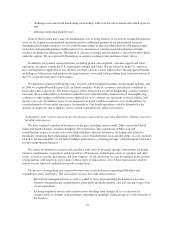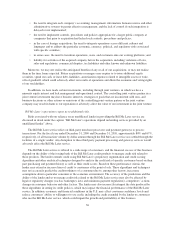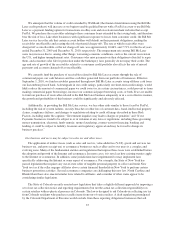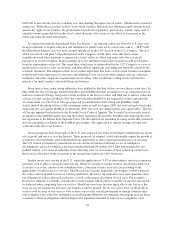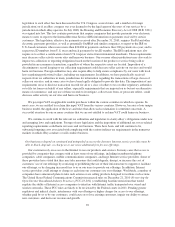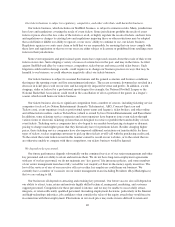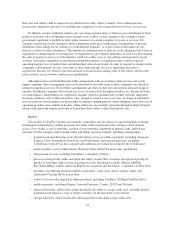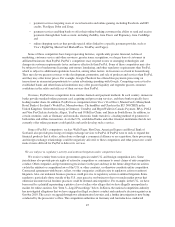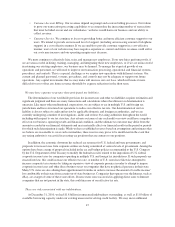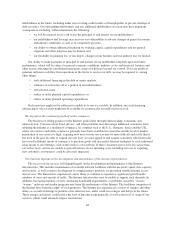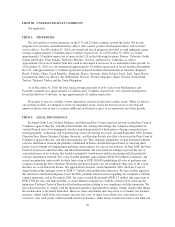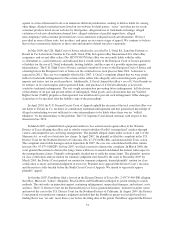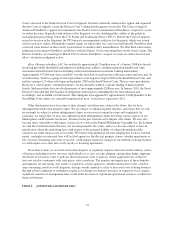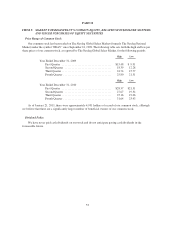eBay 2010 Annual Report Download - page 49
Download and view the complete annual report
Please find page 49 of the 2010 eBay annual report below. You can navigate through the pages in the report by either clicking on the pages listed below, or by using the keyword search tool below to find specific information within the annual report.their sites and which could be impractical or inefficient for eBay sellers to match. New technologies may
increase the competitive pressures by enabling our competitors to offer more efficient or lower-cost services.
In addition, certain established retailers may encourage manufacturers to limit or cease distribution of their
products to dealers who sell through online channels such as eBay, or may attempt to use existing or future
government regulation to prohibit or limit online commerce in certain categories of goods or services. For
example, manufacturers may attempt to enforce minimum resale price maintenance arrangements to prevent
distributors from selling on our websites or on the Internet generally, or at prices that would make our site
attractive relative to other alternatives. The adoption by manufacturers of policies, or the adoption of new laws or
regulations or interpretations of existing laws or regulations by government authorities, in each case discouraging
the sales of goods or services over the Internet, could force eBay users to stop selling certain products on our
websites. Increased competition or anti-Internet distribution policies or regulations may result in reduced
operating margins, loss of market share and diminished value of our brands. In order to respond to changes in the
competitive environment, we may, from time to time, make pricing, service or marketing decisions or
acquisitions that may be controversial with and lead to dissatisfaction among some of our sellers, which could
reduce activity on our websites and harm our profitability.
Although we have established Internet traffic arrangements with several large online services and search
engine companies, these arrangements may not be renewed on favorable terms or these companies may decide to
promote competitive services. Even if these arrangements are renewed, they may not result in increased usage of
our sites. In addition, companies that control user access to transactions through network access, Internet browsers,
or search engines could promote our competitors, channel current or potential users to their vertically integrated
electronic commerce sites or their advertisers’ sites, attempt to restrict access to our sites, or charge us substantial
fees for inclusion. Search engines are increasingly becoming a starting point for online shopping, and as the costs of
operating an online store continue to decline, online sellers may increasingly sell goods through multiple channels,
which could reduce the number and value of transactions these sellers conduct through our sites.
PayPal
The markets for PayPal’s product are intensely competitive and are subject to rapid technological change,
including but not limited to: mobile payments, electronic funds transfer networks starting to allow Internet
access, cross-border access to networks, creation of new networks, expansion of prepaid cards, and bill pay
networks. PayPal competes with existing online and offline payment methods, including, among others:
• payment card merchant processors that offer their services to online merchants, including American
Express, Chase Paymentech, First Data, and Wells Fargo; and payment gateways, including
CyberSource (which Visa has acquired) and Authorize.net (which has merged with CyberSource);
• money remitters such as MoneyGram, Western Union, Global Payments, Inc. and Euronet;
• bill payment services, including CheckFree, a subsidiary of Fiserv;
• processors that provide online merchants the ability to offer their customers the option of paying for
purchases from their bank account or paying on credit, including Acculynk, Moneta, eBillMe,
Revolution Money (which American Express has acquired) and TeleCheck, a subsidiary of First Data;
• providers of traditional payment methods, particularly credit cards, checks, money orders, and
Automated Clearing House transactions;
• issuers of stored value targeted at online payments, including VisaBuxx, NetSpend and GreenDot;
• mobile payments, including Obopay, Amazon Payments, Crandy, LUUP and Payforit;
• Amazon Payments, which offers online merchants the ability to accept credit card- and bank-funded
payments from Amazon’s base of online customers on the merchant’s own website;
• Google Checkout, which enables the online payment of merchants using credit cards;
44



